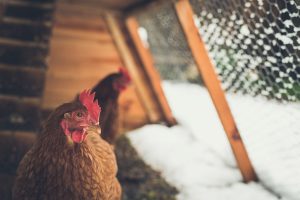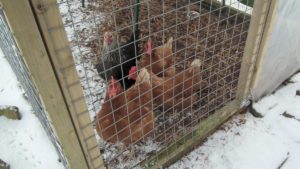How to Keep Your Poultry Healthy During the Winter Months: Tips for February
Winter can be a tough time for poultry, with cold temperatures, wet and muddy conditions, and limited foraged/outdoor food sources – especially with current Avian Flu regulations keeping flocks under cover. But with the right care, your chickens will stay healthy and happy during these months.
This February, make sure your poultry is well-nourished and protected from the elements. Here are a few tips for keeping your chickens healthy during the winter months, including how to provide a balanced diet, proper shelter, and preventative care for common winter ailments. With these simple steps, you can ensure your chickens remain happy and healthy all winter long.
Provide a Balanced Diet
Chickens are omnivores, which means they love to eat a variety of plant and animal foods. In the winter, a diet that’s low in carbohydrates and high in protein is particularly important. In addition, poultry requires a higher intake of vitamins and minerals during these months, as the weather and natural conditions are less favorable for foraging. Chickens have a highly specialized and specialized digestive system that’s capable of fermenting feedstuffs to produce a range of useful byproducts.
It’s important (especially in Winter) to provide a balanced poultry layers pellet before offering any additional “treat” foods such as cracked corn. It is also a good idea to provide plenty of fresh greens during the Winter months especially if your flock is kept in a covered run.
Construct Adequate Shelter for Poultry in Winter Months
It’s important to have a well-constructed shelter for your chickens during the winter months. Putting up a roof and siding on your chicken run is also important for Avian Flu protection. A roof will keep rain and snow off of the chickens, and will also provide them with shelter from extreme temperatures. Keep the floor of the coop and run dry so chickens can walk without slipping and without getting very wet feet all day long as this can lead to illnesses such as bumblefoot. We use woodchip in the run and straw plus newspaper in the coop and nesting boxes.
Ensure Adequate Ventilation
It can be tempting in cold weather to think your flock need more warmth in their coop at night, but very rarely is this the case. In fact in order to prevent respiratory issues, it’s important to have adequate ventilation in the coop. If the humidity gets too high in the coop, condensation can build up on the inside walls and cause rot. Ideally, ventilation should be sufficient enough that chickens can easily flap their wings and fly around the coop. So, it is crucial not to add coverings to your chicken coop that block the ventilation holes.
Keep the Coop Clean
Chickens are messy birds. They like to dust-bathe, and will often engage in “floor dusting” behavior. As a result, there will be plenty of droppings in and around the coop. It’s important to clean this up frequently. Chickens do not clean themselves, so it’s your job to keep the coop and run clean. It’s also a good idea to regularly (daily) clean out the feeder, drinker, and any treat bowls to help prevent cross-contamination.
Monitor The Flock’s Water Supply & Environment
It’s important to keep a close eye on your water supply during the winter. If your water freezes, it can damage your drinker as well as not fiving your flock fresh water to drink. It’s also important to keep the water clean so that it does not become contaminated with harmful pathogens. During the winter, your water supply should be changed each week or more often if possible.
It’s important to regularly monitor your environment and make any necessary repairs. It’s easy for things to break or become damaged in the winter, when there’s less sunlight and there’s less outdoor activity. If the walls or roof become damaged, you’ll want to make sure that it is repaired as soon as possible to prevent water and wind from getting inside. If the damage is significant, you’ll want to consider replacing the structure.
Preventative Care for Common Winter Ailments
It’s important to be proactive when it comes to preventative care during the winter months. A number of winter ailments can occur in chickens, including respiratory problems, parasites, and injuries. Proper shelter, adequate ventilation, and a balanced diet can help your chickens avoid many common winter ailments. In some cases, however, you may need to take extra care. Please see our articles on Poultry Illnesses and Ailments for more information.




Leave a Comment Here on Poultry in the Winter Months: Tips for February